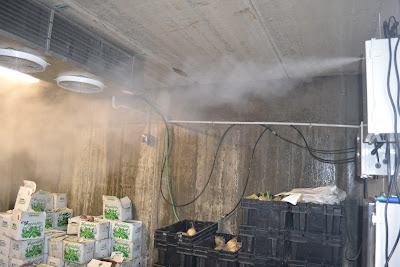This would be in addition to the seven that they already had standing and in production. Outside one of them, they had a couple rows of 4 ft Quick Hoops low tunnels that had smaller tunnels within them covering some overwintering scallions and kale. The inner cover was perforated plastic.
They took us in the first high tunnel that was in production, where they had Raccoon spinach and mesclun mix under two layers of Covertan row cover they had acquired from Rain Flo. They said they could get two cuts of the mesclun over the winter and that the germ was erratic because of moisture inconsistency when they irrigated. Usually the fall germ is good. Chris asked about the Bloomsdale (because it’s an open-pollinated variety) , and they said they were getting very high germ results with it both outside in the fields as well as in the tunnels and that it was a better germinator than hybrid varieties in similar situations. They said they always got a thick, consistent stand with Bloomsdale. They also mentioned that all their lettuce and greens were seeded with a Sutton Jr. seeder.
The second high tunnel – a 30 x 140 ft Ledgewood, had 1500 laying hens in it. They all ran to our end of the tunnel when we entered. Mark said that egg cleaning was their bottleneck and that they were only able to reach that number by the use of an automatic egg washing machine. Once they had that, it was game on. They rotate the hens around to a different high tunnel each season. In summer, they are pastured and roost in these mobile chicken coops. They then scrape out most of the litter and spread it for field crops. They “follow” the chickens with tomatoes, because they have a 90 day window for the manure to cure. By the time the fruits are maturing, they are past that window. He said the birds can easily pay for a house. We noticed the orange twine hanging from above. Mark said they use the smaller size orange bailing twine because it costs less than tomato twine to trellis their tomatoes. The twine that was there had been in use for three years already.
The third high tunnel had garlic overwintering that they were going to harvest in spring for bunching. They will also be trialing onion sets that will be planted in February for a spring crop.
The fourth high tunnel had a self-driven commercial greens harvester in it. There is a great video of it being used here. They bought this second hand from some farmers that were selling off all their equipment. It was originally sold by Bernard Parker Marketing Limited, a UK company which now seems to be out of business. I believe the original manufacturer is the Italian company Ortomec, based on the looks of the product, which is a few years old now, but I am not certain.
Outside, there were numerous Quick Hoops stacked up against one of the other high tunnel’s end walls. They obviously have embraced low tunnel use in the Spring and/or Fall.
The fifth high tunnel had Bordeaux spinach, Tyee spinach, Bright Lights that were forced, scallions, beet greens, arugula, and mesclun.
The sixth that we entered was a 20 ft Quonset style (round) that had been converted to move on skids. Inside they had Tyee spinach overwintering under row cover. Their anchors for the tunnel were also inside the tunnel and consisted of earth augers and come-alongs.
We peaked briefly in the seventh tunnel and moved on to the barn.
We stopped in the tool room, where we discussed some operational difficulties they had with our four row seeder. I noted that the four row was a little finicky and liked a nicely prepared bed. I told them that a bed roller was in the works. We also discussed how to sharpen the Johnny’s Greens Harvesters. They said that it would work well at first, but it would get dull quickly.
They took us into the egg cleaning room and fired up the egg washer for us.
This just cracked me up.
Behind that room was their original cold storage room with an air conditioner and Coolbot.
Next was the washroom, which was being used when we visited. Having outgrown the Coolbot room, they had recently added a commercial walk in cooler and loading dock.
This just cracked me up.
Behind that room was their original cold storage room with an air conditioner and Coolbot.
Next was the washroom, which was being used when we visited. Having outgrown the Coolbot room, they had recently added a commercial walk in cooler and loading dock.
They were especially proud of that space. They had everything set up on wheels to roll out from the washroom, into the cooler, and then into the delivery truck. Even their Grindstone Farm root washer was set up to roll wherever it was needed, which was accomplished by mounting it on a scaffolding base with casters.
Finally, we got a tour of the art gallery. As many farmers are doing these days, they’d added another point of interest at their farm, to serve as a second income source while increasing foot traffic for the farm stand. They would also sometimes distribute CSA shares inside the gallery, which would increase foot traffic for it. Clever.
Mark and Christa very graciously donated their time to show us around and we thank them for it. The complete slide show follows.
Adam.
Adam Lemieux
Tools & Supplies Manager













































